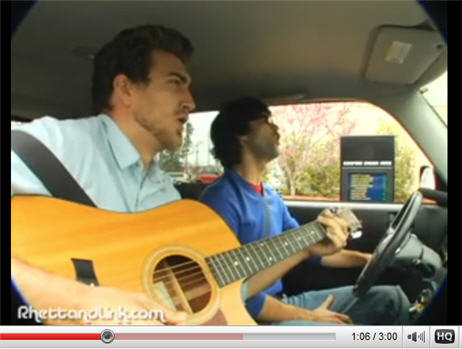-
Common Craft's New Subscription Model Offers Lessons for Video Creators
Online video has spurred countless talented video creators to pursue their dreams and connect with their audiences. But finding a sustainable business model remains a persistent challenge. Should videos be free and ad-supported? Or paid for by viewers on a one-off iTunes type basis? Or be part of a "freemium" model? Or be in a subscription service? Or maybe some of all of the above? Experimentation, intuition, knowing who the customer is and listening to feedback, and taking risks must all be taken into account when determining the right business model.
And that's why Common Craft, a husband-and-wife team that focuses exclusively on producing simple, short explanation-oriented videos often on technology topics (see below for an example) that have been viewed 35 million times in the last 4 years offers useful lessons for video creators. After pursuing a pure iTunes approach with payments on a per-video basis while doggedly staying away from an ad-supported model, the company has now completely shifted its model to subscriptions-only.
Categories: Indie Video
Topics: Common Craft
-
Rhett and Link Are Another Example of YouTube's Franchise Value
If you haven't heard of Rhett and Link, you need to check them out to understand another of the myriad ways that video is being democratized, advertising is being reimagined and value is being built in YouTube. My wife brought Rhett and Link to my attention after hearing a report about them on National Public Radio last night.
Rhett and Link are two engineers and lifelong friends who operate out of a North Carolina basement writing and performing short comedic songs. Emboldened by family and friends they've created over 200 videos that have generated 16 million views and a loyal following on YouTube and their own site rhettandlink.com. No doubt you'll agree their songs and videos are funny, clever and very memorable.
Calling themselves "internetainers" and having generated a signature style, they are now being contracted by advertisers to turn their talent toward developing promotion songs. Their folk song drive-through order for Taco Bell has generated almost 1 million views on YouTube. And their hilarious spot for Red House furniture store in Highpoint, NC, which spoofs race relations, has generated almost 1.5 million views. There will certainly be more of these promotional songs in the hopper. That's because given what these advertisers are probably paying for these spots, their ROIs must be off the charts, especially compared to traditional advertising tactics. And with Rhett and Link's following, all new promotional songs now have a built in viral tailwind.
Rhett and Link remind me of Lee and Sachi LeFever of Common Craft, who I recently wrote about. They are all part of an emerging group of talent who would be considered "non-professionals" by the traditional standards of entertainment, advertising and communications. But with their own authentic and engaging approaches and direct access to audiences, they have been able to break through and attract large followings.
A key linchpin to all of their success is YouTube, whose massive audience and viral sharing is unmatched. Even as it strives for partnerships with premium quality video providers, YouTube's value to the Common Crafts and Rhett and Links of the world is undeniable. If leveraged properly, as it has been by these creators (and by others like Demand Media), it can also lead to genuine businesses opportunities.
When I repeatedly say that YouTube has massive franchise value - even though it is currently unprofitable - it's these kinds of examples, which put YouTube in the center of an emerging grassroots video ecosystem, that I'm thinking of. There's no other site that comes close to YouTube's reach, brand awareness or viral sharing potential.
If you have other examples along these lines, please send them along!
What do you think? Post a comment now.
Categories: Advertising, Indie Video
Topics: Common Craft, Rhett and Link, YouTube
-
Common Craft Shows that Video Entrepreneurship is Alive and Well
Far, far from the world of big media, where broadband delivery is causing multi-billion dollar tectonic plate shifts, there is a Seattle-based husband-and-wife team who are demonstrating that video is truly a wide open playing field for entrepreneurs with clever new ideas and the pluck to pursue them. Big media's broadband pursuits provide ample grist for my daily VideoNuze posts, but periodic detours describing entrepreneurial companies like Common Craft show how fundamentally empowering broadband video has become.
I discovered Common Craft last week when I noticed a prompt at the top of Twitter.com for a video explaining "Twitter in Plain English." I clicked and found myself watching a short video with simple paper cutouts acting out how Twitter works, along with a voice-over providing simple but detailed narration. It perfectly explained what Twitter is about in 2 1/2 minutes.
Intrigued, I followed the producer's link to CommonCraft.com and found an entire library of similarly formatted videos, on topics such as technology, society, money and green. I tweeted how cool I thought the videos were and 20 minutes later, Chris Savage at Wistia sent me an email saying he saw my tweet. He said
 he knows the Common Craft founders and offered an introduction. Shortly thereafter I found myself talking to Lee LeFever, half of the Common Craft team. (as an aside, talk about the power of Twitter to connect people!).
he knows the Common Craft founders and offered an introduction. Shortly thereafter I found myself talking to Lee LeFever, half of the Common Craft team. (as an aside, talk about the power of Twitter to connect people!).The whole Common Craft story is well-laid out here, but the abbreviated version is that Lee's on-the-job experience prompted him to write blog posts explaining RSS and Wikis in "plain English." On a hunch, he and his wife Sachi turned the RSS post into a short video, sort of stumbling onto the idea of the paper cutouts (which they call "paperworks") and narration. When it was posted in April, 2007, it was promoted on Digg and got tons of views. Next they turned the wikis post into a successful video and Lee discovered his knack for productizing explanation (to date Lee says their videos have racked up 10M+ views and have been translated into 50+ languages).
Given the Common Craft team's lack of video experience, their videos might get thrown into the "user generated" category. But the quality and power of their videos instantly blurs the distinction between what is UGC and what is "premium." Lee explained to me that it was in fact their lack of formal video training that freed them to do things that "professionals' likely wouldn't have done, allowing them to create their own authentic style.
The capper to the Common Craft story is that not only have the LeFevers figured out how to make quality video, they've figured out an effective way to promote and monetize it. Eschewing the custom video path (which they started to gain traction with), they've instead focused on licensing their videos for training and educational purposes. Lee says they're already generating $15K/mo in license fees. The key is still using YouTube and their own site to offer full length free viewing, with prompts to transact. They've also leveraged their reach by creating something called the "Explainer Network" which provides referrals to a handful of custom video companies.
I'm drawn to the Common Craft story because it is a business model completely rooted in the broadband video economy. The LeFevers demonstrate that broadband really does enable "amateurs" to found successful video businesses that in the past would have been prohibitively costly and untenable. I have no doubt we'll see plenty more success stories like Common Craft's in the years to come, as broadband becomes an ever more pervasive part of our economy.
What do you think? Post a comment now.
Categories: Indie Video
Topics: Common Craft, Twitter
Posts for 'Common Craft'
|



